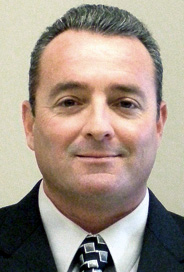

Friday, February 22, 2008

David Aey
It would be nearly impossible to restore Aey’s name to all ballots, an elections board official said.
By PETER H. MILLIKEN
VINDICATOR STAFF WRITER
YOUNGSTOWN — A ruling by U.S. District Judge Peter C. Economus on David P. Aey’s request to be reinstated to the primary ballot as a candidate for Mahoning County sheriff isn’t expected until next week.
That ruling will be based on written legal briefs to be filed by the parties in the case, and no oral arguments are scheduled. The deadline for filing the briefs is 4 p.m. Monday, and Aey’s lawyer, Martin E. Yavorcik, said he believes the judge will rule soon thereafter.
Judge Economus declined Thursday to issue a temporary restraining order restoring Aey to the March 4 Democratic primary ballot.
The judge did allow the Ohio Attorney General’s office and Sheriff Randall A. Wellington to intervene to protect their legal interests in the case.
Although an audience gathered Thursday afternoon in the courtroom for a public hearing on Aey’s lawsuit, which seeks to have his name restored to the ballot, no such hearing was held.
Instead, attorneys for the parties discussed the case with the judge in his chambers. The board of elections was represented by the county prosecutor’s office.
On Tuesday, Aey had filed a motion for a temporary restraining order that would bar the county board of elections from removing his name from the ballot.
That filing was in response to a Feb. 14 Ohio Supreme Court decision that ordered the board to remove Aey’s name from the ballot. The high court granted a request from Wellington to have Aey removed from the ballot because he lacks two years of peace officer experience at the rank of corporal or above, which state law requires of candidates for sheriff.
In his federal lawsuit, Aey maintains that the state law is an unconstitutional prior restraint on his free speech rights and is contrary to the First and 14th amendments to the U.S. Constitution.
“I’d like to be on the ballot because I feel confident that, not only am I qualified, but I could win the race. I have an obligation to myself, my family and my supporters to see this thing through, and that’s exactly what I’m going to do,” Aey said after court Thursday.
It’s “nearly impossible” for Mahoning County Board of Elections’ employees to reprogram its 1,152 voting machines to place Aey’s name back on the ballot if a decision favorable to the former candidate by the federal judge is made Monday, said Thomas McCabe, the board’s director.
“We could have scrambled [Thursday] to program the machines, but not Monday,” he said.
The Ohio Attorney General’s office is intervening in the federal case to defend the constitutionality of the state election qualification law.
Wellington intervened because he said the board of elections and the state attorney general’s office may not adequately represent his interests “in not running against an unqualified candidate.”
“There’ll be briefs only. It’s a legal issue whether or not the statute is constitutional,” Yavorcik explained. “The judge says he believes we can do it simply by briefs, and he’ll rule,’’ Yavorcik added.
If the Ohio Supreme Court ruling stands, Wellington will be unopposed for re-election in the Democratic primary. He has no Republican opposition.
Filing deadlines are March 3 for independent candidates and Sept. 3 for write-in candidates.